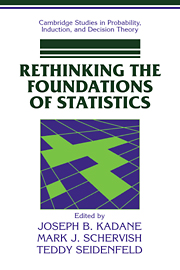Book contents
- Frontmatter
- Contents
- Introduction
- PART 1 DECISION THEORY FOR COOPERATIVE DECISION MAKING
- PART 2 THE TRUTH ABOUT CONSEQUENCES
- PART 3 NON-COOPERATIVE DECISION MAKING, INFERENCE, AND LEARNING WITH SHARED EVIDENCE
- 3.1 Subjective Probability and the Theory of Games
- 3.2 Equilibrium, Common Knowledge, and Optimal Sequential Decisions
- 3.3 A Fair Minimax Theorem for Two-Person (Zero-Sum) Games Involving Finitely Additive Strategies
- 3.4 Randomization in a Bayesian Perspective
- 3.5 Characterization of Externally Bayesian Pooling Operators
- 3.6 An Approach to Consensus and Certainty with Increasing Evidence
- 3.7 Reasoning to a Foregone Conclusion
- 3.8 When Several Bayesians Agree That There Will Be No Reasoning to a Foregone Conclusion
- Index of Names
- Subject Index
3.3 - A Fair Minimax Theorem for Two-Person (Zero-Sum) Games Involving Finitely Additive Strategies
Published online by Cambridge University Press: 05 June 2012
- Frontmatter
- Contents
- Introduction
- PART 1 DECISION THEORY FOR COOPERATIVE DECISION MAKING
- PART 2 THE TRUTH ABOUT CONSEQUENCES
- PART 3 NON-COOPERATIVE DECISION MAKING, INFERENCE, AND LEARNING WITH SHARED EVIDENCE
- 3.1 Subjective Probability and the Theory of Games
- 3.2 Equilibrium, Common Knowledge, and Optimal Sequential Decisions
- 3.3 A Fair Minimax Theorem for Two-Person (Zero-Sum) Games Involving Finitely Additive Strategies
- 3.4 Randomization in a Bayesian Perspective
- 3.5 Characterization of Externally Bayesian Pooling Operators
- 3.6 An Approach to Consensus and Certainty with Increasing Evidence
- 3.7 Reasoning to a Foregone Conclusion
- 3.8 When Several Bayesians Agree That There Will Be No Reasoning to a Foregone Conclusion
- Index of Names
- Subject Index
Summary
ABSTRACT
In this chapter we discuss the sensitivity of the minimax theorem to the cardinality of the set of pure strategies. In this light, we examine an infinite game due to Wald and its solutions in the space of finitely additive (f.a.) strategies.
Finitely additive joint distributions depend, in general, upon the order in which expectations are composed out of the players' separate strategies. This is connected to the phenomenon of “non-conglomerability” (so-called by deFinetti), which we illustrate and explain. It is shown that the player with the “inside integral” in a joint f.a. distribution has the advantage.
In reaction to this asymmetry, we propose a family of (weighted) symmetrized joint distributions and show that this approach permits “fair” solutions to fully symmetric games, e.g., Wald's game. We develop a minimax theorem for this family of symmetrized joint distributions using a condition formulated in terms of a pseudo-metric on the space of f.a. strategies. Moreover, the resulting game can be solved in the metric completion of this space. The metrical approach to a minimax theorem is contrasted with the more familiar appeal to compactifications, and we explain why the latter appears not to work for our purposes of making symmetric games “fair.” We conclude with a brief discussion of three open questions relating to our proposal for f.a. game theory.
INTRODUCTION
In this essay we derive results for finitely additive (mixed) strategies in two-person, zero-sum games with bounded payoffs.
- Type
- Chapter
- Information
- Rethinking the Foundations of Statistics , pp. 267 - 292Publisher: Cambridge University PressPrint publication year: 1999

